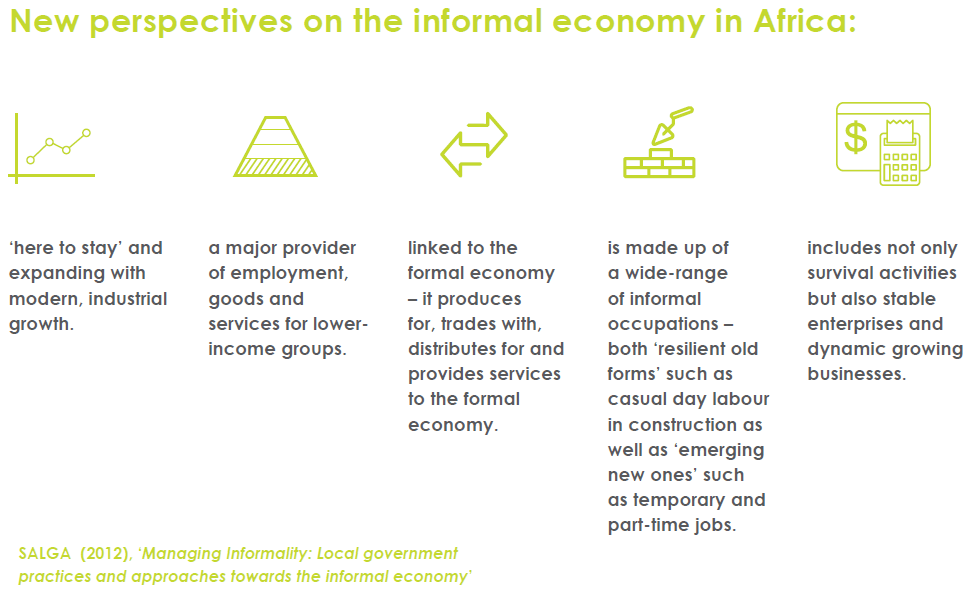Job Creation
Capetonians continue to turn economic challenges into opportunities.
While Cape Town’s narrow unemployment rate is significantly lower than South Africa’s as a whole, and the broad unemployment rate is the lowest out of all metropolitan municipalities, the hard truth is that a significant portion of Capetonians still remain unemployed. This is worsening over these challenging times. However, Cape Town’s economy has progressively shifted towards a predominantly service-driven one with growth in tertiary sector industries. In fact, it is outpacing national growth in both primary and secondary sector industries over the last decade. Furthermore, the local economy has recently grown even faster as it is not heavily dependent on the mineral sector, which has experienced a recent national downturn too.
Increasing employment opportunities in Cape Town is a crucial component of building resilience to shocks and stresses. While the local economy has outperformed the national economy, it is still inextricably linked to the same international investor sentiment. On a provincial and divisional level, Cape Town is building resilience to the ongoing risks facing the local economy. Impacts of globalisation, climate change, rapid technological change and urbanization are being managed effectively and key opportunities include:
- cross-section job creation from highly skilled to semi-skilled and unskilled
- addressing the skills mismatch and high youth unemployment
- overcoming our resource constraints
- establishing infrastructure for a knowledge economy
- attracting foreign direct investment
- supporting Small Medium and Micro-enterprises (SMMEs) within the local economy
Fostering Green Economic Growth
While there are many constraints facing Cape Town and the region’s resources, specifically water and energy, these can also be capitalised upon to create new economic opportunities in the green economy. There are numerous opportunities to facilitate an increase in domestic and foreign investment in the local production and assembly of green products. This also includes the provision of green services, and there are a multitude of resilience dividends in doing so.
Besides creating new jobs and helping to ensure a just transition for workers who may be negatively affected by changes in the future economy, the new products and services produced can contribute to ensuring the ongoing sustainability and cost-competitiveness of local businesses within the green economy. In this line of thinking, the Atlantis SEZ was declared a green technology SEZ in December 2018. Additional initiatives include:
- Leveraging the newly created Atlantis Special Economic Zone to cultivate the green economy while promoting economic mobility.
- Mainstreaming sustainable procurement in supply chains for an increase in public spending on green goods and services, ensuring that public procurement becomes increasingly responsible.
- Developing eco-industrial parks using industrial symbiosis methodology for improved resource efficiency, inclusive of materials, water, energy, logistics and expertise.
- Undertaking a waste economy study to understand the opportunities of the circular economy to create a detailed understanding and addressing of the multitude of waste streams in the city-region.
Enterprise Development in The Informal Economy
The informal sector is a crucial and frequently overlooked part of Cape Town’s economy. It incorporates a broad range of economic activities and business typologies in a diverse range of geographic locations across the city, with varying intensities of relationships with formal business.
While the informal economy in Cape Town is smaller than in other South African metropolitan areas, and significantly smaller than in large cities elsewhere on the African continent, its contribution to generating income for the most vulnerable households and its impact in terms of poverty reduction are disproportionately large. The City has been taking steps to reduce this load and vulnerability, particularly through initiatives that are:
- Creating informal economic activity hubs that are supported by enabling zoning regulations where light manufacturing businesses can benefit from a pooling of resources.
- Developing an informal enterprise survey to gain richer data on the informal economy for improved insights and knowledge about enterprise-level activity, particularly within Cape Town’s informal economy.
Connecting Workforces with A Changing Economy
Rapid technological changes and the increasing application of digital technologies across the workplace and within households, creates new opportunities for societal advancement but also places more challenges on government, this is why the City is:
- Expanding the reach of digital literacy programmes so that Capetonians are able to adapt to rapid technological changes and are empowered to participate in the digital economy as entrepreneurs, workers and customers.
- Extending the incentivised employee retention programme for an increased retention of previously unemployed Capetonians through deliberate interventions by employers and NGOs, including the provision of support networks.
Achieve A Resilient Local Economy
During the recent drought, the City and businesses collaborated extensively to share information and drive down consumption of water, contributing to the ‘whole-of-society’ approach that ultimately helped to avoid Day Zero. Pivoting off the drought there is an opportunity to formalise these types of partnerships, including:
- Building an enterprise-based commitment to resilience in the city, especially in terms of both businesses and their employees being able to collectively and rapidly respond to shocks and stresses.
- Promoting Cape Town as a resilient destination to visit and invest in for increased investor and visitor confidence. Global awareness of the city’s efforts to understand its own risk profile and to build responses that strengthen urban resilience is underway.
- Offering support services to retain existing businesses and preventing them from closing down. It is important to ensure that existing businesses in Cape Town are able to survive, sustain and grow during challenging times.
- Future casting for just transitions in a rapidly changing global economy, particularly for proactive societal responses to changing drivers to, among other things, rapid technological changes, the global response to climate change, and variances in the international trade regimes.
Contact us today if you’d like to discuss the City of Cape Town’s Resilience Strategy or specifically the initiatives in place for Cape Town job creation.
